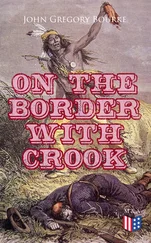John Lang - Stories of the Border Marches
Здесь есть возможность читать онлайн «John Lang - Stories of the Border Marches» — ознакомительный отрывок электронной книги совершенно бесплатно, а после прочтения отрывка купить полную версию. В некоторых случаях можно слушать аудио, скачать через торрент в формате fb2 и присутствует краткое содержание. Жанр: literature_19, foreign_antique, foreign_prose, на английском языке. Описание произведения, (предисловие) а так же отзывы посетителей доступны на портале библиотеки ЛибКат.
- Название:Stories of the Border Marches
- Автор:
- Жанр:
- Год:неизвестен
- ISBN:нет данных
- Рейтинг книги:5 / 5. Голосов: 1
-
Избранное:Добавить в избранное
- Отзывы:
-
Ваша оценка:
- 100
- 1
- 2
- 3
- 4
- 5
Stories of the Border Marches: краткое содержание, описание и аннотация
Предлагаем к чтению аннотацию, описание, краткое содержание или предисловие (зависит от того, что написал сам автор книги «Stories of the Border Marches»). Если вы не нашли необходимую информацию о книге — напишите в комментариях, мы постараемся отыскать её.
Stories of the Border Marches — читать онлайн ознакомительный отрывок
Ниже представлен текст книги, разбитый по страницам. Система сохранения места последней прочитанной страницы, позволяет с удобством читать онлайн бесплатно книгу «Stories of the Border Marches», без необходимости каждый раз заново искать на чём Вы остановились. Поставьте закладку, и сможете в любой момент перейти на страницу, на которой закончили чтение.
Интервал:
Закладка:
At a place called "Dick's Tree," not far from Longtown, there still stands the "smiddy" where lived the blacksmith who had the honour of knocking off Kinmont Willie's fetters. Sir Walter Scott has handed on the story of the smith's daughter who, as a little child, was roused at daybreak by a "sair clatter" of horses, and shouts for her father, followed, as the smith slept soundly, by a lance being thrust through the window. Looking out in the dim grey of the morning, the child saw "more gentlemen than she had ever seen before in one place, all on horseback, in armour, and dripping wet – and that Kinmont Willie, who sat woman-fashion behind one of them, was the biggest carle she ever saw – and there was much merriment in the party."
Furious was the hive of wasps that Buccleuch brought about his head by thus insultingly casting a stone into the English bike. The wrath of Queen Elizabeth was unappeasable. Scrope found it sounded better to multiply the number of the raiders by five, but Scottish tongues were not slow to tell the affronting truth, and the Englishmen of Carlisle had the extra bitterness of being butts for the none too subtle jests of every Scot on the Border. The success of so daring a venture made the Scottish reivers arrogant. Between June 19 and July 24 of that year, the spoils of the western Marches were a thousand and sixty-one cattle and ninety-eight horses, and some thirty steadings and other buildings, mostly in Gilsland, were burned. The angry English made reprisals. It was in one of them that the Scots who were taken were leashed "like doggis," and for this degradation Buccleuch and Ker of Cessford made the English pay most handsomely. Together those "twoo fyrebrandes of the Border" led an incursion into Tynedale, where, in broad daylight, they burned three hundred steadings and dwelling-houses, many stables, barns, and other outhouses, slew with the sword fourteen of those who had been in the Scottish raid, and brought back a handsome booty.
King Jamie was in a most uncomfortable position. Queen Elizabeth demanded Buccleuch's punishment, and he argued. She nagged, and he wriggled. Finally, after continual angry remonstrances from the insulted English monarch, he had to give in, and Buccleuch and Ker had both, at different periods, to suffer imprisonment for the sin, in the virgin Queen's eyes, of the rescue of Kinmont Willie, and of its bloody consequences. We realise what was the reputation of Buccleuch and of his followers when we see into what a state of panic the mere prospect of having the Border chieftain as prisoner at Berwick-on-Tweed threw Sir John Carey, the governor. To Lord Hunsdon he wrote: "I entreat your Lordship that I may not become the jailor of so dangerous a prisoner or, at least, that I may know whether I shall keep him like a prisoner or no? for there is not a worse or more dangerous place in England to keep him than this; it is so near his friends, and, besides, so many in this town willing to pleasure him, and his escape may be so easily made; and once out of this town he is past recovery. Wherefore I humbly beseech your honor, let him be removed from hence to a more secure place, for I protest to the Almightie God, before I will take the charge to kepe him here, I will desire to be put in prison myself, and to have a keeper of me. For what care soever be had of him here, he shall want no furtherance whatsoever wit of man can devise, if he himself list to make an escape. So I pray your Lordship, even for God's sake and for the love of a brother, to relieve me from this danger." But there was no attempt at a rescue of Buccleuch. He did not desire it. Not as a criminal, but as a state prisoner he gave himself up to the English governor, and, having given his parole, he kept it, like the gentleman of stainless honour that he was.
Two years after his imprisonment at Berwick-on-Tweed, Buccleuch, on his way with two hundred followers to serve with Prince Maurice of Nassau in the Low Countries – a raid from which many a Borderer never returned – was sufficiently received into favour to be permitted to go to London and kiss the hand of her most gracious Majesty, Queen Elizabeth. The remembrance of Kinmont Willie still rankled in that most unforgiving of royal breasts.
"How dared you," she imperiously demanded, "undertake an enterprise so desperate and presumptuous?"
"Dared?" answered Buccleuch; "what is it that a man dares not do?"
Elizabeth turned impetuously to a lord-in-waiting. "With ten thousand such men," she said, "our brother of Scotland might shake the firmest throne in Europe."
That Kinmont Willie avenged himself not once, but many times, on those who had treacherously trapped him and done their best to make him meat for the greedy English gibbet, is not a matter of surmise, but one of history. His ride into Carlisle on that bleak March day, and the long days and dreary nights he spent in chains in the English gaol, were little likely to engender a gentle and forgiving spirit in the breast of one of the most fiery of the "minions of the moon." When, in 1600, he raided Scrope's tenants, they were given good cause to regret the happenings in which Scrope had taken so prominent a part.
We have no record of the end of Kinmont Willie, and can but hope, for his sake, that he died the death he would have died – a good horse under him almost to the end, a good sword in his hand, open sky above him, and round him the caller breeze that has blown across the Border hills. In a lonely little graveyard in the Debatable Land, close to the Water of Sark, and near the March dyke between the two countries, his body is said to rest. Does there never come a night, when the moon is hidden behind a dark scud of clouds, and the old reiver, growing restless in his grave, finds somewhere the shade of a horse that, in its day, could gallop with the best, and rides again across the Border, to meet once more his "auld enemies" of England, and, to the joyous accompaniment of the lowing of cattle and the jingle of spurs, returns to his lodging as the first cock crows, and grey morning breaks?
"O, they rade in the rain, in the days that are gane,
In the rain and the wind and the lave;
They shoutit in the ha' and they routit on the hill,
But they're a' quaitit noo in the grave."
IN THE DAYS OF THE '15
Close on two hundred years back from the present time there stood far up the South Tyne, beyond Haltwhistle, on the road – then little better than a bridle-track – running over the Cumberland border by Brampton, an inn which in those days was a house of no little importance in that wild and remote country.
If its old walls could speak, what, for instance, might they not have told of Jacobite plottings? Beneath its roof was held many a meeting of the supporters of the King "over the water," James the Eighth; and here, riding up from Dilston, not seldom came the unfortunate Earl of Derwentwater, to take part in the Jacobite deliberations. The young lord and the horse he usually rode were figures familiar and welcome to the country folk around, and at the inn they were as well known as was the landlord himself. It was not long after a secret meeting held here in the earlier half of the year 1715 that the warrants were issued which led to Derwentwater's flight from Dilston, and precipitated the Rising that within a few months rolled so many gallant heads in the dust of the scaffold.
It might perhaps have been better for Lord Derwentwater had he been less beloved in Northumberland, and had his devoted admirers been unable to send him notice of the coming of the warrant for his arrest. He might not then have had opportunity to commit himself so deeply; and there might have been a romantic and pathetic figure the less in the doleful history of that unhappy period. As it was, he had time to get clear away, and was able to lie securely hid, partly in farmhouses, partly near Shaftoe Crags, till the news reached him that Forster had raised the standard of rebellion. On 6th October 1715, at the head of a little company of gentlemen and armed servants, he joined Forster at Greenrig.
Читать дальшеИнтервал:
Закладка:
Похожие книги на «Stories of the Border Marches»
Представляем Вашему вниманию похожие книги на «Stories of the Border Marches» списком для выбора. Мы отобрали схожую по названию и смыслу литературу в надежде предоставить читателям больше вариантов отыскать новые, интересные, ещё непрочитанные произведения.
Обсуждение, отзывы о книге «Stories of the Border Marches» и просто собственные мнения читателей. Оставьте ваши комментарии, напишите, что Вы думаете о произведении, его смысле или главных героях. Укажите что конкретно понравилось, а что нет, и почему Вы так считаете.












